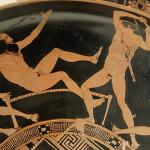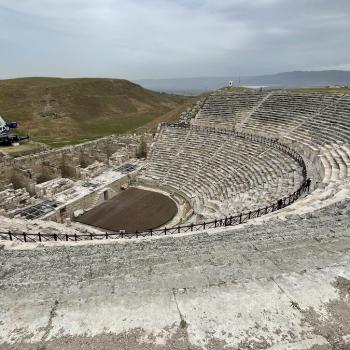
I learned early on in my Christian life that the shortest verse in the Bible was “Jesus wept” (John 11:35). It wasn’t until studying Greek that I discovered that John 11:35 is three words, although one of them is a single letter definite article. The actual shortest verse in the Greek NT is 1 Thessalonians 5:17. ln English it is often translated with three words, “pray without ceasing” (ESV) although in Greek it is only two. You can get it to two words in English easily enough, “pray unceasingly,” but then you have competition for the shortest verse—insert smile face.
A Digression
The real surprise, however, occurred when learning that the Bible was not divided into chapter and verse until the 1500s! And for good reason. With the emergence of the printing press making the Bible more accessible, chapter and verse divisions made studying and recalling the location of thoughts and stories easier. Yet, for most of the Bible’s history, people had no idea about the shortest verse because there wasn’t one. For that matter, no one knew that Esther 8:9 was the longest verse either! Such trivia may not have practical value in Sunday dinner banter but entertaining nonetheless.
Still, chapter and verse divisions do highlight common practices, doctrines, and history that we might otherwise miss. But they also create practices, doctrines, and history that show a bias inherent in the divisions. At times, when combined with translator decisions about sentence divisions and word choices, we might be confronted with a theology that reflects our times much more than the time of the first century. The theological gymnastics of complementarians and egalitarians are perfect examples, but I digress.
Jesus Prayed
Yes, Jesus wept. Certainly not because Lazarus died. He knew He would raise him from death. Even so, Jesus was moved and troubled by what was happening around Him. And look at what He does next.
Then Jesus, deeply moved again, came to the tomb. It was a cave, and a stone lay against it. Jesus said, “Take away the stone.” Martha, the sister of the dead man, said to him, “Lord, by this time there will be an odor, for he has been dead four days.” Jesus said to her, “Did I not tell you that if you believed you would see the glory of God?” So they took away the stone. And Jesus lifted up his eyes and said, “Father, I thank you that you have heard me. I knew that you always hear me, but I said this on account of the people standing around, that they may believe that you sent me.” When he had said these things, he cried out with a loud voice, “Lazarus, come out.” The man who had died came out, his hands and feet bound with linen strips, and his face wrapped with a cloth. Jesus said to them, “Unbind him, and let him go.” (John 11:38-44; emphasis added)
So, yes, Jesus wept. But He also prayed! And in His prayer, two things grab my attention: 1) Jesus knows that His Father hears Him; 2) Jesus prays for the benefit of others. Christ-followers pray like Jesus prayed. They are confident that the Father hears them and they pray for others to know Jesus. This is the seventh characteristic of a disciple.
“Seventh, disciples pray for opportunities to share the gospel, because they know God is most glorified when more people are worshipping him (Eph 6:18–20; 1 Tim 2:1–4). It certainly is not the only thing disciples pray for, but it is a preoccupation of theirs.” (Ephesiology, loc: 3751)
Paul Prayed
Paul, no doubt imitating Jesus, demonstrates the same posture in prayer. No, it’s not necessarily bowing with hands folded and eyes closed. Nor is it removing your hat—if you’re a male—or covering your head—if you’re female. Wonderful traditions by the way but they are just that, even Procrustean traditions. Paul’s prayer posture constituted a confidence that God heard him as well as a commitment to others.
We have beautiful examples of Paul’s prayers in his letter to the saints in Ephesus (1:15-23; 3:14-19). And isn’t it appropriate that the longest sentence in the Bible—Ephesians 1:15-23—is a prayer! Indeed, Paul demonstrates the importance of prayer simply by the number of times he references it in his letters. This isn’t an exhaustive list but consider the following:
- The Holy Spirit prays when we cannot find words – Romans 8:26-27
- We are to pray constantly – Romans 12:12
- Praying with the mind is more fruitful than praying in tongues – 1 Corinthians 14:14-15
- Pray for the restoration of those who have erred – 2 Corinthians 13:9
- Keep alert in our prayers as we pray for each other – Ephesians 6:18
- Pray for the bold declaration of the gospel – Ephesians 6:19-20
- Pray with thanksgiving – Philippians 4:6
- Be watchful in prayer – Colossians 4:2
- Pray in earnest for others – 1 Thessalonians 3:10
- Pray for the spread of the word of the Lord – 2 Thessalonians 3:1
- Prayer for those in authority – 1 Timothy 2:1-2
- Pray for those you disciple – 2 Timothy 1:3; Philemon 4-6
Emphasizing Prayer
In every letter that Paul wrote, except for the so-called “pastoral epistle” of Titus, he shares something about prayer. Come to think of it, how pastoral can an epistle be if it doesn’t reference prayer? Doesn’t really matter though. We intuitively know that prayer isn’t a simple religious act. It is the place where we commune with the Father and intercede for others. And John reminds us:
“Beloved, if our heart does not condemn us, we have confidence before God; and whatever we ask we receive from him, because we keep his commandments and do what pleases him. And this is his commandment, that we believe in the name of his Son Jesus Christ and love one another, just as he has commanded us. Whoever keeps his commandments abides in God, and God in him. And by this we know that he abides in us, by the Spirit whom he has given us.” (1 John 3:21-24)

















